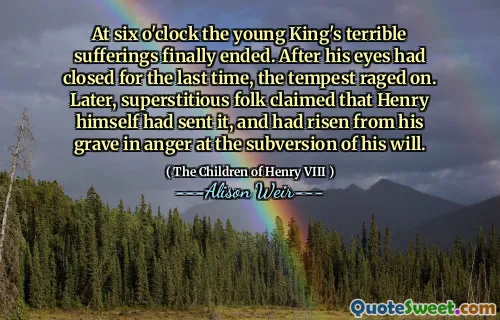An objective viewpoint was beyond her; she was single-minded to a fault.
In "The Children of Henry VIII," author Alison Weir illustrates the intense focus of one character, who is so fixated on her own perspective that she struggles to maintain any sense of objectivity. This singular mindset reveals a depth of conviction, yet it also highlights a potential flaw in her ability to understand the broader implications of her actions and decisions. The phrase "An objective viewpoint was beyond her; she was single-minded to a fault" emphasizes her inability to consider alternative viewpoints, suggesting that her intense dedication could lead to narrow-mindedness. This theme reflects the complexities of historical figures and captivates readers as they explore the consequences of such unwavering determination.
In "The Children of Henry VIII," author Alison Weir illustrates the intense focus of one character, who is so fixated on her own perspective that she struggles to maintain any sense of objectivity. This singular mindset reveals a depth of conviction, yet it also highlights a potential flaw in her ability to understand the broader implications of her actions and decisions.
The phrase "An objective viewpoint was beyond her; she was single-minded to a fault" emphasizes her inability to consider alternative viewpoints, suggesting that her intense dedication could lead to narrow-mindedness. This theme reflects the complexities of historical figures and captivates readers as they explore the consequences of such unwavering determination.
